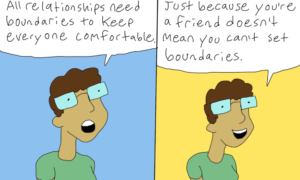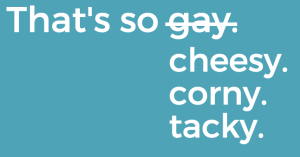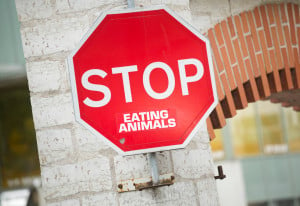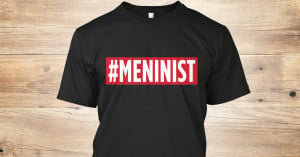I love me some allies.
As a trans person with very limited energy, nothing warms my heart more than a good ally stepping up to the plate when I’m tired of swinging.
That’s why I’m actually really happy to be writing this article.
“Hang on, Sam,” you might say. “You said we’re making mistakes. Why are you happy about that?”
Mistakes, especially when they come from allies, are opportunities to have really important conversations. Your making a mistake means that you were doing – you were active instead of passive.
Instead of hanging out at the sidelines, you were showing up as an ally.
I want you to keep showing up, even if that means you’ll make mistakes. When you do (and we all do), I hope you’ll see those mistakes as a chance to go deeper as an activist, and do better.
That kind of commitment – to keep learning and growing – is what really excites me.
So let’s bring your allyship to the next level.
Here are some common pitfalls that trans allies fall into – and what you need to know to avoid them.
1. Measuring Our Success By How Well We ‘Pass’ (Or Otherwise Fixating On Our Looks)
I know that I’m the handsomest babe alive. And I appreciate the compliments – really, I do. But it’s important to realize that your praise can be problematic, depending on where it’s coming from.
Oftentimes, complimenting a trans person’s appearance is usually just coded language for “I can’t even tell that you’re trans!”
It’s upholding this idea that trans people should aspire towards cisnormative standards of beauty, and that the only trans folks who are beautiful are those who can conform.
So where does that leave trans people who don’t “blend in?” Where does that leave trans people who don’t aspire towards cis/anglo/normative standards of beauty?
Our worth as trans folks does not depend on whether or not we “look cis.” Our worth as trans does not depend on our ability to “pass.” Our worth as trans people does not rely upon how fuckable we are in the eyes of cis people.
Really, there’s no such thing as “looking cis” – that assumes you can know someone is trans based on appearance in the first place.
Praising trans folks for passing just reinforces this idea that being read as trans is undesirable, or less than. It equates trans with bad and cis with good. Yikes.
It can also become a problem when you focus so much on our appearance that it becomes the focus of our being.
Conversations about trans people already tend to center around our physical transitions. Many of us have worked tirelessly to move the conversation away from our bodies and onto our whole selves, as well as the pressing issues that impact our lives.
Applauding our good looks is not a replacement for the real activism that needs to be done.
So can you compliment a trans person? Certainly! But not because you’re surprised that we don’t “look trans,” not if your standards of beauty do not validate all trans people, and not because you’re fixated on our bodies and can’t see past them.
Your compliments should not uphold our oppression – and are not a substitute for real allyship.
2. That Damn Obsession with the Gender Binary
Let’s say it together now: There are more than two genders. There are more than two genders. There are more than two genders.
There’s even the experience of having no gender (or being agender), which many trans allies often forget.
There are an alarming number of allies that only want to talk about and validate binary trans folks, while completely ignoring the existence of non-binary, genderqueer, and gender non-conforming people.
Non-binary trans folks exist, and if they aren’t a part of your trans allyship, it’s time to reevaluate. Maintaining the idea that the only trans folks worth going to bat for are binary folks is further marginalizing a huge part of our community.
And before you say “I know about non-binary people!” I want you to ask yourself how you actively include them.
It comes across in your language use, for example. When you intend to include everyone, but instead say “men and women” versus “people of all genders” or “my trans brothers and sisters” versus “my trans siblings.”
It’s when someone comes out as trans, and you assume they must be FtM or MtF. It’s when you assume that someone identifies within the binary at all.
I notice it when I see a Tumblr page or social media account that should be including voices from all of our community, but instead only features binary trans voices.
When you ignore us, you’re only pushing us further into the margins. If you want to support the trans community, you can’t pick and choose – you’re all in for trans folks, or you aren’t an ally.
If you aren’t familiar with any non-binary writers (hello, hi, how are you?), content creators, or activists, you need to do your homework.
Boost the signal for our entire community, not just a sliver of it.
I love Laverne Cox as much as the next queer, but if she’s the only trans person you’re retweeting, you might want to ask yourself why.
3. Forgetting That ‘Biological Sex’ Is Not an Objective Truth
When we talk about biological sex being “what’s between your legs,” we’re forgetting that sex is actually much more complicated than that. Genitalia, chromosomes, hormones, and secondary sex characteristics all contribute to our assigned sex at birth, but ultimately, sex is just that: assigned.
Biological sex is a social construction, meaning it’s something we as a culture have created. That’s not to say it isn’t relevant to our health or that it doesn’t influence our personal realities, but the categories of “female” and “male” must be recognized for what they really are.
They’re categories, arbitrarily assigned to people – even assigned to folks’ whose bodies do not align with our cultural ideas of sex, otherwise known as intersex.
Saying trans folks are “female-bodied” or “male-bodied” is often used as an attempt to undermine our gender identities and categorize our bodies in ways that we don’t consent to. Even if you don’t intend this, your use of this language only validates it as acceptable for others to use as well.
For example, as a transmasculine person, I don’t consider any part of my body to be “feminine” or “female” – it’s my body, and just like an elbow or a nose isn’t “female,” nor should any other part of my body be labeled as such. Bodies are just bodies.
For too long, we’ve conflated sex and gender – and assumed that both are absolutes. But there is so much variation in the human body, and so much variation in gender, that ultimately, forcing these categories onto people can do more harm than good.
When we conceive of biological sex being two narrow boxes – male and female – that everyone fits into, we ignore the existence of intersex folks, we ignore the reality that human bodies are radically diverse, and we ignore the fact that people conceptualize and understand their bodies in very different ways, depending on culture and context.
As an ally, it isn’t your place to describe the bodies of trans people and assume their sex and assume the way that they talk about their bodies. Similarly, it isn’t your place to assign a gender and assume their identity.
So no more of this “female-bodied” or “male-bodied” bullshit, okay?
If you’re interested in reading more on this topic, I’d encourage you to read up on it here and here.
4. Relying on the ‘Born This Way’ Script
This one is real, real hard to let go of.
Folks find it really comfortable – really easy – to say that we’re just born a certain way. It takes a nuanced conversation about gender and puts it in a nice, tidy package.
We’ve assumed, up until this point, that gender was this essential thing we were all born with. Accepting that not everyone is born with a particular gender challenges the status quo.
And sheesh, talk about uncomfortable. It flips all our assumptions about gender on their head.
But while it’s easy to say that transgender people are just “born that way,” the truth is, many trans folks simply don’t see it that way.
Imposing a singular narrative onto all trans people, with the assumption that it is accurate for everyone, isn’t exactly what anti-oppression work looks like.
As a trans person, I don’t believe that I was born trans. For me, it’s an identity that I took on later in life, when the discomfort with my assigned gender began to manifest more intensely. I don’t know if that discomfort was always present, but it’s not a requirement that it be there in order to be trans.
There are plenty of things we figure out about ourselves later in life. It doesn’t make them any less valid, honest, or important realizations.
The rights of transgender people should not rely on whether or not we were “born this way.”
The fact of the matter is, as human beings who are simply trying to live out our truths, we deserve dignity, respect, and equal treatment under the law, whether we realized we were trans at age three or age 73.
Stop basing your arguments in the idea that a quality must be inherent in order for it to be legitimate.
A disability can manifest at age 20, and you would still not stand for discrimination against that person; you may not have been born poor, but I imagine you wouldn’t tolerate bigotry against working class folks.
If you are against intolerance of any kind, whether or not we were trans from the day we were born is totally irrelevant.
5. Only Talking About Us When We’re Celebrities – Or When We’re Dead
I mean, this one is pretty self-explanatory.
What kinds of media are you engaging with, and what kind of content are you sharing? Are you only interested in trans folks when they’ve achieved celebrity status or when they’ve died?
That’s not to say that there aren’t important discussions to be had about both. It’s important, however, to boost the signal for more than just celebrities and victims.
Why?
When you only care about celebrities, you’re giving visibility to folks who are already wildly successful and thus not really representative of the realities of most trans folks.
When you only care about us after we’ve died, you may not actually be helping to prevent these tragic deaths. And this obsession with trans death bombards our community with a singular representation of trans people as destined to die.
There needs to be a balance – a way of critically engaging with this epidemic of lost lives, while also giving us real visibility in all aspects of our lives.
Trans folks need diverse stories and narratives that truly represent our triumphs and our struggles. Not just the best and worst case scenarios, but the diverse experiences that reside in between.
We are doing important work, right now, to support our community. And if you aren’t boosting the signal and you aren’t supporting us in that work, being unseen only feeds back into a system that causes further tragedy and more loss.
Please don’t forget that we’re here.
6. Calling In Cis Folks Only When We’re Around
I’ve had friends that would correct someone who misgendered me while I was around, but make no effort to correct them if I wasn’t there. And let me tell you: That made me feel gross.
Because what is your intention really, then? To earn brownie points for being a good ally, or to actually make a positive impact?
There are allies who will advocate for trans folks if we’re watching, but never call other cis folks’ on their shit unless there’s a trans person there to impress.
If you’re an ally to trans folks, you need to call other cis folks in – not just when trans folks are there to give you a cookie or a gold star, but whenever the opportunity is there and it feels safe to do so, because it’s the right thing to do.
If you are an ally in front of us, but a bystander behind our backs, you need to reflect on your motivations.
Ask yourself why you only show up when there’s a trans person there to be accountable to. Is it because you feel obligated? Is it because you don’t feel it’s important if you don’t have someone there to validate or reward you?
I can’t answer those questions for you. All I can do is encourage you to educate others, especially when we aren’t around. Because while your cis privilege allows you to choose whether or not you confront transphobia, we don’t get that choice.
***
You might be thinking, “Oh, geez, Sam. I’m never going to get this ally thing right, am I?”
It’s not about getting it right or being perfect – it’s about learning.
It’s about being mindful of your impact, tuning in when trans folks offer criticism, knowing how and when to apologize, doing your best to confront your privilege, and using your position to empower others while not overshadowing them.
In other words, it’s a process. And in some form or another, it’s a process that every ally – whoever they’re an ally to or for – is going through.
For what it’s worth, I’d venture to say that, since you made it through this article, your trans allyship isn’t so half-baked after all.
Because even if you’ve made every mistake on this list, your commitment to change is what matters at the end of the day.
[do_widget id=’text-101′]
Sam Dylan Finch a Contributing Writer for Everyday Feminism. He is queer writer, activist, and educator based in the San Francisco Bay Area. In addition to his work at Everyday Feminism, he is also the founder of Let’s Queer Things Up!, his hella queer and very awesome blog. You can learn more about him here and read his articles here. Follow him on Twitter @samdylanfinch.
Search our 3000+ articles!
Read our articles about:
Our online racial justice training
Used by hundreds of universities, non-profits, and businesses.
Click to learn more
Most Read Articles
- « Previous
- 1
- …
- 30
- 31
- 32




















